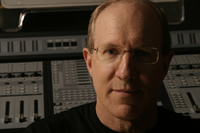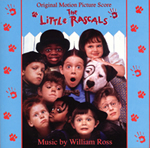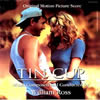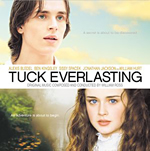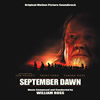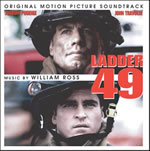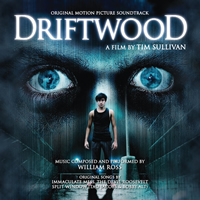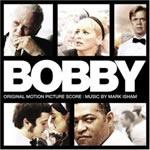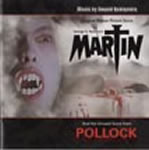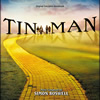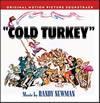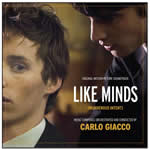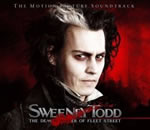SOUNDTRACK GENRES |
| SHEET MUSIC |
| LPS AND CASSETTES |
| BARGAIN BIN |
| RARE AND ONE OF A KIND |
| AUTOGRAPHED CDs |
| NON-SOUNDTRACK CDS |
| RELATED LINKS |
| CONTACT US |
Past Columns
8/1/07
8/14/07
8/26/07
9/10/07
9/24/07
10/8/07
10/22/07
11/5/07
11/19/07
Randall D. Larson's SOUNDTRAX
|
Soundtrax: Ross Everlasting
December 3rd, 2007By Randall D. Larson
A Conversation with William Ross
William Ross is one of contemporary film music’s most underrated composers. When he’s not producing and arranging for all manner of pop music icons such as Barbra Streisand, Josh Groban, Quincy Jones and Babyface, Ross has maintained a strenuous career orchestrating for most of the big name Hollywood composers – John Williams, Alan Silvestri, Danny Elfman, Klaus Badelt, and the late Michael Kamen. Equally adept behind the composer’s score sheets, Ross has scored several dozen films on his own, starting out with episodic television work and graduating into feature films with One Good Cop and Look Who’s Talking Now in the early 1990s. Among Ross’ most notable film scores are the 1994 feature film remake of The Little Rascals, The Amazing Panda Adventure, the IMAX film T-Rex: Back to the Cretaceous, and Jay Russell’s My Dog Skip, a warm family drama that gave Malcolm in the Middle’s Franke Muniz his first feature film role. One of Ross’s most remarkable film scores was for Tuck Everlasting, an expressive and poignant folk-based sore for Jay Russell’s compelling fountain of youth fantasy. Earlier this year, Ross served as music director and conductor for the 79th Academy Awards. Ross’ most recent works are September Dawn and Driftwood, both recently released in limited CD editions by BSX Records. I spoke to Ross last Thursday, discussing at length his endeavors in film music and his approach to scoring films such as these.
Q: What initially led you into film composing?
William Ross: It was part of a journey that I was on, coming out of college. I was a pre-med major in college – I never had any idea that you could make a living in the arts because I never experienced that in my family, which was very unmusical. But in college I discovered music was my passion. I was really interested in how music was put together, how it was constructed and structured, how you organized sound to make it meaningful. That journey I’m talking about led me into classical music, the pieces of music we all know and love, and then hearing and analyzing scores, started to become aware that soundtracks were a combination of everything – it was like one giant spice cabinet where you can use any spice you want. People who would reject listening to The Rite of Spring or Xenakis or someone at a concert situation would have no problem listening to it if it were used in a film score with appropriate footage. So that fascinated me. What really fueled my passion were some of the scores that John Williams had done, certainly Star Wars – I heard that and was mesmerized, like so many others who have experienced John’s work. I followed my heart, and that’s how I ended up in film music.
Q: What steps did you take to make a career out of it?
William Ross: There’s not that much room for composers – in terms of the number of films put out, I think last year it was 500 or 600 movies, so if you think about it there’s not that many opportunities, really. So in order to put food on the table for my family, since I had a lot of experience as an arranger, I parlayed that into orchestration. I did a lot of orchestrating work for years, although I was interested in writing. A man who became a great friend was Dennis McCarthy, who is just a wonderful man, a wonderful human being, and a terrific talent, and he needed a help on a show [he was scoring]. Another good friend of mine, Bruce Babcock, was working with Dennis on it and said, “why don’t we bring this guy in, Bill?” The three of us worked together for two or three years on MacGyver, and that was just the best workshop imaginable. I did some work there and that led into some more TV stuff, and I was orchestrating movie, and landed a film, and got another film, and the next thing I knew I started doing movies.
Q: With your ongoing experience in orchestration, how would you describe the role of the orchestrator in films?
William Ross: There’s the composer, there’s the arranger, and there’s the orchestrator, and everyone is incredibly confused about what those roles are, including my wife and family. My parents always ask me, now what is it that you do? Nobody has an idea! Basically, if you think of music as divided into the part that you actually own and the part you fill out and add to, the melody is the part of music that most famously you own. When you’re composing your job is to write the melody and the various pieces of music that go with it. That is what the true composer is going to do. The arranger is a person who comes along who doesn’t own the melody – they are given a melody by somebody else, and they create the all the backgrounds, all the lines, and those things. And the orchestrator is the person who doesn’t own the melody either, but takes what the compose and arranger have provided and writes out by hand showing all the instruments of the orchestra and what they’re supposed to be playing, using all the melodies and the musical lines that should theoretically already be in the piece. Those are the three most famous roles of people that manufacture and create music.
In the movie business, composers don’t have the time, so very often, they’ll sketch out the composition – that sketch can be very elaborate and describe in detail what each instruments should be playing, or it can show not too much and just sketch out a basic melody line. It depends on how much time and how much inclination the composer wants to put into it. The sketch can be a piano piece, it can be a MIDI piece where there’s synthesizer and violins, or it can be a variety. So, when you orchestrate in the movie business you have to be prepared to walk in and do whatever’s necessary – and that can be a wide range of things depending upon that 800 pound gorilla, which is the deadline.
Q: I’ve always felt the orchestrators were the unsung heroes of music. Often the elaborate instrumental settings through which the music plays are the doing of an orchestrator who fleshes out the piece and establishes much of what the other instruments are doing to enhance and convey the composer’s initial musical ideas.
William Ross: You’re right. The why that sketch arrives to an orchestrator in varying degrees of completion are, again, the amount of time a composer has. A composer and an orchestrator, by the way, may have a shorthand, especially if a composer has worked with the same orchestrator for a long time, and that can save both of them time. It may appear that there’s not much on the sketch, but it may just be enough to do what the orchestrator needs to speed along. In the case of people like John Williams, those sketches are so complete, that if you orchestrated it would sound like John! Every now and then a composer comes along who doesn’t have a rich background with the orchestra but has been asked to do that as part of spreading their wings and growing with the music, they hire a good orchestrator, they learn that it’s just a process that happens. I’ve been on every single side imaginable of that equation, it fascinates me!
Q: What are some of your recollections of starting out in television, working in episodes of Matlock and Beauty and the Beast, as you were beginning to establish yourself not only as an orchestrator but as a composer?
William Ross: It was thrilling! It was wonderful to be able to get the opportunity to do it. Beauty and the Beast was just an absolutely wonderful experience. Don Davis was the person who asked me to come on there, and I used to write with Don for a while. We did so many episodes and then I started doing my own episodes of it, and it was spectacular.
Q: A fair amount of the scores that you composed during have been for comedy films - Little Rascals, Cops and Robbersons, Black Sheep, Tin Cup. What kinds of techniques have you developed provide the right music to make comedy work in films such as these?
William Ross: I think comedy is the hardest thing to do, without question. As I’ve written more music, one thing I’ve become more convinced of is that I don’t want to write comedic music! The goal with comedies is to try and figure out how to write music that doesn’t say “laugh” but that feels inevitable and natural. That’s the challenge. In most comedies, as part of the emotional landscape of the movie, very often they’ll have these tender moments, which are great opportunities for music; they’ll have different kinds of moments that are not necessarily overtly funny, and those can be great moments for the music. But writing funny music is something that is very difficult. What makes funny music?
Q: When I think of funny music, I usually think of Carl Stalling and cartoon music – and yet in the comedy features you’ve done, you’re playing straight man to make the environment of the film – its story and setting – real, allowing the comedy to then work naturally within that environment.
William Ross: You know what - I’m going to quote you! What you just said is a lot better than what I said, and I agree wholeheartedly with it. That’s really the mission. And by the way, just as a footnote, Carl Stalling is one of my favorites! I did several of the Tiny Toons Adventures and they were just a complete blast to do. What a wonderful experience!
Q: You did a film in 1994, The Little Rascals, which obviously has a very fluent and very recognizable musical history dating back to the ‘30s. To what extent did that former music impact what you were writing for the new feature?
William Ross: Having heard that theme for so many years, the first thing I did was take a shot at reorchestrating it a little bit so that we did a bigger version with the orchestra, while trying to keep the same flavor. That was a starting point for me – listening to some of those things and see if some of it could be used. As it turns out, I really didn’t end up using that much. I used the familiar theme for the Main Title, because it worked when you saw “Little Rascals,” and I think I used it a couple times in the movie, once in a while between Darla and Alfalfa. A lot of the other stuff was just updated a little more, just to give it a more current feel.
Q: What was your approach to the 1996 romantic comedy, Tin Cup?
William Ross: I really enjoyed that experience and I thought [director] Ron Shelton was just a terrific guy to work for. A great director and a really interesting storyteller. One thing I’ve learned watching Ron’s movies is, he just backs away from heroes that are perfect; he doesn’t buy into that. He likes people with flesh and blood and all their idiosyncrasies. To him, that gives them character, and that’s who that Kevin Costner character was. That was a fun movie to do.
Q: What were the challenges of scoring that film?
William Ross: The challenge of the film was: what music do you play for a bunch of people playing golf? That was a real challenge! They were temping it, trying to figure that out, and one day I was in there and Ron was talking, and he said “I don’t know, we’ve got to find the right thing. When I’m out on the golf course” – and he was hitting his chest with his fist – “I just feel like a” thump-thump-thump-thump. And I thought, well, you know, why don’t we try a thump-thump-thump-thump?! And that became some of the music when they were out there, a synth loop and some other things going, and I tried to build that into some of the orchestration. The romantic music just flowed out, but the golf part was the challenge. It’s funny because a couple of years after that, I think it was the US Open golf tournament, they used some of that music on a helicopter shot, flying in to the golf course, and I thought, “Yeah! I guess that is what golf feels like!”
Q: You gave the golf scenes a Hoosiers-esque beat and rhythm and excitement that really moved them along.
William Ross: Thank you. That was the goal, because we looked at those scenes without music and with different kinds of temps, and they just didn’t seemed to work. I mean, look at a golf match: you have people whispering, and there’s no noise. Everything is quiet, and so here we are bashing away! It seems incongruous, but somehow it worked!
Q: I’m especially fond of a film you did in 2002 called Tuck Everlasting, which was a rich, vibrant fantasy film. On one level, it’s a very homespun Americana a drama, yet it opens up these rich, fantastique elements, which the score emphasized very well. What are your recollections and the challenges on that score?
William Ross: I loved that score, it’s really one of my favorites. Jay Russell was the director, and that was the second movie I did for him [My Dog Skip was the first]. He’s the most musical guy I’ve known in that capacity, so that was a real treat. This may sound odd, we wanted this feminine approach, and that’s part of why the music sounds the way it does. It’s approached from that direction. This love that stands time, reaches from one generation to the next, this eternal fountain of youth thing going on, that thematic stuff along with the orchestration, the way we approached the Alexis Bledel character, it all seemed to work together. There was a desire to have it feel folkish at the same time, and every now and then there would be some elements that would harken back to that folk element. It was a chance to write what I thought were some nice themes that informed the movie and kept the romance going.
Q: I believe that a film where the story is very fantastical puts a greater responsibility on the music, since you’re not simply describing characters, events, and situations, but you’re really helping to sell an environment or a concept that is fantastical, to aid the audience’s suspension of disbelief to make the story work within that environment. Were you aware of that responsibility or the need to validate through your music the concepts of the film that were very outlandish?
William Ross: I think you make a really good point, and that’s one of the reasons that science fiction and space movies have a lot of music. The stranger the environment gets, music is a good way to anchor people emotionally to this bizarre place. The most bizarre thing of all is when things are completely animated and have nothing to do with any real life, where you look at that without music, and you just suddenly want that music to anchor you. That’s one of the reasons why it’s very easy for animated movies to be filled with music. It’s exactly what you said, the music provides an emotional context. It helps the person relate to this strange environment.
Q: Along those lines, certainly, you helped to craft a very fantastical environment with your adaptation of John Williams’ music for Harry Potter and the Chamber of Secrets. And here again, of course, you already have a definition of the music from the first film to contend with.
William Ross: The problem for me, for Harry Potter, was to be invisible. It wasn’t like “John’s not available, let’s get Bill Ross.” It was John himself who talked to me about how much he loved the whole idea of Harry Potter, he loved the characters and everything about it, and he really wanted to do that film. It wasn’t like he was going, “well, you go off and do your thing, Bill, and I hope it sounds like me.” Not at all. He was looking for somebody who could channel him and really – and maybe this is just my way of looking at it – but I thought, the problem here is to do this score and at the end of the day have nobody know that you were there. The more you decide “hey, this is an opportunity to show people what I can do” and step into it, the more you’re going to step away from what the original problem is. So I immersed myself in the world of John Williams’ Potter music, and in that immersion tried to get to the point when music would come out, it would come out fully formed as John would do it. As I told John, that’s a fool’s errand – nobody is going to write like John! But having material from the first score, working with a great music editor, Peter Myles, who had done the first one and was temping the second one, was helpful. A lot of music that was in place, and my job to come in was to move it around, and write material that would sound as though John were there.
Q: A film you scored that recalls Tuck Everlasting to me because it’s also a period film and it’s also a love story, although without the fantasy elements, is September Dawn. What was your approach to that particular score?
William Ross: That’s another score I really like. The director’s a guy named Chris Cain, who is just wonderful. He’s the school of director who says “here, write me a score. I’ll see you on the scoring stage!” He gives direction in the sense that he knows emotionally what he wants, but he doesn’t get in and fine tune the details. That’s your job and he expects you to do that, and that’s really nice. I didn’t want that one to be a big, over the top score. Looking at the movie, it just seemed like a lot of it was looking inward, and there was an intimacy about a lot of it, and I thought that too big or an orchestra would get in the way. I thought that solo instruments would be the way to go here: the violin, the cello, piano, guitar, some solo woodwinds. I tried to keep it a little more intimate and not let it sweep the same way that I might on a different movie, even though there were some areas where you could sweep. It just seemed to not be that film. I’ve done so much big orchestral stuff that I’m really looking for things that aren’t that, and a film like September Dawn was terrific for me. There’s so much emotion in the solo instruments, when used well and mixed in with the orchestra or synths or whatever you’re doing, they really offer a great opportunity.
Q: Another film that I am especially fond of is Ladder 49, because my working career is in the fire department here as a communications supervisor both in the dispatch center and out at the field command post, so it’s a film that obviously touched where I am very strongly. When you got into that film, what approach did you work out with Jay Russell for the score?
William Ross: That score that developed as a process. Jay had some original ideas about guitars and percussion that we explored, and we discovered some things about the sound of fire that impacted whether that was going to be a successful approach. We decided that may have felt too over the top. But we went reconnoitered at a certain point and decided to go down a direction that was a little more homespun in terms of thematic elements. There was the Irish element going through there that connected to this idea that it’s like the heart of the fireman. I’m not sure how that got translated to the audience, but for whatever reason it seemed to work.
Q: There’s a nobility to the music.
William Ross: Definitely that. One of the things I’ve learned about Jay Russell is that he looks for the nobility in his characters. That’s one of the things he tries to bring out. He certainly brought it out in My Dog Skip with the character there, and the behavior of Alexis in Tuck Everlasting, and the characters in Ladder 49. There’s a nobility that he likes to explore, and I think that’s one of the reasons his films are endearing.
Q: Ladder 49 also featured lots of songs, in one form or another. Do you ever feel the songs are in competition with score or in a film like Ladder 49? How did you work among those to create what is the final mix of music and song?
William Ross: There’s so many different ways to approach that. I’m not sure that there is one particular balance that is right or wrong, I think it can be subjective. I don’t have any problem with songs. To me, everything that happens in a movie if there’s an appropriate storytelling reason for it to be there, then my hat’s off to it, and that can be the song or whatever. I think the songs can be really effective depending on how they are used, or they can be not so effective. So I think Jay’s a smart guy when he sits down to look at the emotional landscape of the movie, and I think if he feels that a song is going to help him get what he wants emotionally there, more than score or equal to, or he just wants a break from score, or for whatever reason that he does it, I’ve been pretty impressed that the choice is a thoughtful one and worthwhile.
Q: Now, Driftwood, which you’ve just scores, is the first actual horror score you’ve done and certainly one of darkest tinged films you’ve composed. Coming into this film, looking at it in the spotting session, what called out as far as what you felt was needed musically and how did that evolve throughout the process? [Warning: spoilers ahead!]
William Ross: When I saw the movie I said to Tim Sullivan, the director, “to me, the heart of the movie, it’s a character study and it happens to be played out in this horror movie fashion. If I were going to do the score, I would focus more on the characters, and not try and focus on the horror.” I thought the horror part would take care of itself, although I ended up doing some of that, but I was more interested in contrasting the horrific stuff with emotional music. Well, not overtly emotional, but things that would be a little more haunting, a little more mysterious. For the character of Jonathan, I used solo cello a lot; I didn’t want to focus on the fact that Jonathan was this zombie-like character stuck in limbo because he had been murdered; I wanted it to be more about the sadness and the poignancy of the fact that this boy’s life had been taken away. It’s a subtle difference, but I think that, to me, makes the movie more emotional, and whenever you can get emotion working on your behalf on a film, you’re half way there.
Q: In Driftwood, what was your technique to fulfill the film’s needs to be a scary movie and yet also enhance our emotional link with the characters?
William Ross: I just didn’t try to drive it that hard. A movie unfolds at its own pace, and if you decide you’re just going top ramp up the pace artificially, there can be a disconnect between the music and the film. I thought subtle would be better for most of the horror stuff. I mean, there were moments of course when you go for it, and I thought a lot of the stuff near the end of the movie had been approached in the temp as very horror movie - the music was playing horror, it was textural in a horrific way, and I thought, okay, you’ve got horror on the screen and you’ve got horror in the music, so where’s the emotion? Tim got that immediately, and he said “exactly – that’s the role of the music. We’ve got horror covered.” So I thought, what if I put a solo cello here against all this nuttiness, then what that’s going to feel like? If you see Jonathan and he’s deformed and dead and zombied, and you hear this solo cello, there’s going to be a poignancy to it, it’s going to have a heart.
Q: This film also featured prominent use of rock songs, and David’s dead brother was a rock star. How did that impact what you were doing with the score?
William Ross: The rock star aspect of the story was covered with the songs, but for me, one of the things I was interested in was driving things more with percussion and synths. All the music, other than the songs, which are by Immaculate Mess, Devil Roosevelt, and Split Window, all of it is just me at a synthesizer. I’m playing all of the instruments. I wanted to go in the direction of a little more sustained sound, letting the percussion drive things, with the pianos and interesting little things over it.
Q: It’s interesting, looking over your filmography, there’s nothing that you’ve been typecast into or locked into, as far as a type of film.
William Ross: Not yet! I think the most typecasting that I’ve done is within big orchestral thematic scores, whether it’s Little Rascals with an orchestra or Potter or, I don’t know, whatever they are, and things like Tuck Everlasting, which is a tweak on that, September Dawn, and Driftwood. That’s the total reason I did Driftwood was to break out of that mold, look for things that were different, that somebody would listen to and say “that doesn’t sound like William Ross!”
This Week’s Recommendations
Mark Isham’s music for Bobby, Emilio Estevez’s fascinating ensemble examination of the shooting of Robert F. Kennedy in the Ambassador Hotel in 1968 and the people who were there that night, has been released by Lakeshore Records, and it’s an amazing and affecting score. Isham, favoring his signature trumpet, provides a respectful composition that not only honors RFK, who had he not have been killed, would very likely have been elected President, possibly making for a very different world than the one we currently inhabit, but also evokes the humanity of the other characters through whose eyes the events of that early June 5th morning are seen. It’s a sorrowful score but also one tinged with hope – the hope that many saw in the person of RFK and what he meant to the country at that time, and the hope of the various ensemble players and what was happening in their lives, forever changed by the events transpiring in the kitchen of that hotel. Isham’s “Prologue” is a wonderful composition, embodying so many elements into its swelling tonality and cadence, the inescapable remembrance of history as well as the individual stories that each of the film’s characters bring with them. Isham lends a sense of continuity and coherence to the film’s ensemble stories (as he did with Crash, a very similarly toned work), he gives the hotel its own theme; and rightly so, since the edifice (demolished shortly after filming was completed) serves in the film as the microcosm in which its myriad stories occur and ultimately intersect). The burbling keyboard pad that represents The Ambassador is compelling and rich, accentuated by a subtle ascending swelling of violins, winds and synths; it also captures just a touch of late 60s music in its keyboard textures. Isham does not so provide individual themes for the various characters who inform the story, but maintains an overall atmosphere derived from his Bobby theme – keeping the focus of all the stories, all the characters and their own issues and interactions, subordinate to the larger issue, which is the person and the fate of Bobby Kennedy. Even with the story is squarely on the individual problems of the characters and RFK remains a remote figure, Isham keeps him central to the movie through his poignant and passionate musical ambiances and motives. It’s a remarkable score, immensely powerful through its very subtleness. It gets under your skin and takes hold of your feelings in a most persuasive manner.
Also available on Island Records is the song soundtrack, featuring a dozen songs of the era along with two of the score tracks which are on the score CD (one of them, Isham’s musical summation, “The Mindless Menace of Violence,” is presented under audio of an RFK speech; that, the introductory RFK speech that opens the CD, and the incredible anthemic duet by Aretha Franklin and Mary J. Blige, “Never Gonna Break My Face,” make the Island soundtrack album equally a must-have.
Showtime’s Dexter may be one of the coolest shows on television. Michael C. Hall stars as a likeable Miami police forensics expert moonlights as a serial killer of criminals who he believes have escaped justice. Rolfe Kent (The Hunting Party, Wedding Crashers) provided the series’ exotic main theme, which headlines Milan’s soundtrack release, but the bulk of the episode scoring was the work of Daniel Licht (Soul Survivors, Oliver Bean, and a bloody fistful of cool horror scores from the early 90s). Milan’s soundtrack, which neatly comes in a blood-red colored jewel case, features nine songs, mostly Cuban/Miami ethnic flavored tunes by Beny Moré, Ray Armando, and Kinky, which also proffers their own cool take on Kent’s series theme. Andy Williams’ kitschy rendition of “Born Free” is also included. There are a trio of dialog tracks mixed in amongst the song tunes. Beginning on track 12, a dozen of Licht’s score tracks are neatly set aside for listening. The score cues are totally minimalist, laying down patterns and loops and eerie atmospheres like the synth undertones of “Debbie Loved Rudy” and “Voodoo Jailtime,” both of which capture a slight yet compelling rhythmic piano pattern over the synths which is both warm and yet slightly off-kilter. The score thus emphasizes the duality of the title character – a do-gooder who yet assumes the self-aware role of monster due to his deeds of “justice” – resonating with tonalities of both respect and distaste toward the character. In the long run, though, Dexter is seen as heroic’ Licht recognizes the questionable nature of Dexter’s activities just as Dexter does – and yet musically supports the character’s self-assurance and righteousness. This is perhaps best conveyed in the Licht’s somewhat Thomas Newmanesque mix of electric and acoustic keyboards and a small chamber ensemble in “New Legs” and its succeeding track, the somber mysterioso “Photo Albums,” the two of which embody this duality very well. “Courting the Night” is a melancholy introspective cue for (sampled?) woodwinds over a gentle cadence of waltzlike acoustic guitar. “Wink” adds a quirky female choir, resounding in slightly mischievous fashion over hammered dulcimer. “Blood Theme” embodies these counterintuitive elements very well, the score’s overall rhythmic atmosphere, a hunt of “Wink’s” breathy women’s voices, the bending fluidity of the strings, over a beat of exotic and fuzzy percussion. (Jonathan Licht remixes these elements into a very flavorful hip-hop variant, “Die This Way,” included as a bonus track.) Daniel Licht’s instrumental palette, nicely credited in the CD booklet, is continually inventive and eclectic, giving the music both a fresh sound and one that is quite appropriate it the developing story’s many layers; Dexter is replete with piano, bell tree, congas, ethnic flutes, gamelan, and middle-eastern violin lending the score an appropriately Miami-esque multi-ethnic flavor. On disc, the twelve score tracks and richly evocative, comfortably atmospheric, and very likable. (iTunes, by the way, offers an additional five score tracks that aren’t on the CD – about another ten minutes of evocative rhythmic atmospheres).
Perseverance Records has reissued composer/producer Donald Rubinstein’s music for Martin (1978), a vampire film that was one of several low budget films George Romero made in the wake of Night of the Living Dead. Previously issued on LP by Varese Sarabande in 1979 and on CD, mastered from vinyl, on the LevelGreen label in 1999, Perseverance has filled out the album with Rubinsteins’ unused score from Pollock, Ed Harris’ directorial debut, a 2000 biopic about American painter Jackson Pollock (Jeff Beal went on to score the final film after a second composer had been hired and fired). The original Martin masters having been lost, the new CD consists of the same vinyl-mastered tracks as the LevelGreen CD, but the Pollock tracks are presented for the first time. Martin, which in 1999 Romero said is his favorite among the films he has made, is about a trouble young man driven by the fantasy of being a vampire. It’s a unique psychological horror/drama that proffers an entirely new take on contemporary vampire mythology. Rubinstein’s score is derived from modern jazz, with lots of riffing from saxophone, clarinet, piano, vibraphone, electric bass, flutes, oboe, and female voice. The score eloquently describes both the contemporary setting of the film as well as the tortured psyche of its protagonist. Singer Betty Silberman provides a unusual vocalization over the main theme, “The Calling,” which personifies Martin’s drive towards pseudo-vampirism. There are tracks that are pure jazz riffing (“Back to Me,” and “Marie – Interlude” being two of the most pronounced and best) and tracks that are pure dramatic atmosphere (“Halloween” with its stark, wind-rustled violins and plodding glissandi of harsh piano notation; a terrific horror film cue), and some tracks are pure strangeness (the echoed vocals and reverberated shakers and bells of “Martin Martin Martin” and “Evocation.”). The End Title is a curiously Martin is a consistently interesting work in both its more accessible traits and its occasional grotesquerie; Rubinstein’s jazz-based ensemble is attractive and enriches the psychological underpinnings of the story. The same is true of his Pollock score, which is also based on modern jazz elements and crafts a peculiar and abstract score rich in psychological detail, although in so doing may have alienated the score’s accessibility to audiences that Harris was trying to reach. In any case, the Pollock score is interesting if unkempt, a bizarre impressionistic tone poem for the artists’ fevered creativity – crude, vague, and fairly disassociated with the mundane artifacts of existence. Soprano Elin Carlson provides rather severe vocalizations for the score, here presented without the kind of instrumental backing that made the Martin vocals so intriguing – Carlson’s voice echoes amidst an austere background of solid air; the result is haunting but unaffecting. The package includes a 14-page booklet filled with a thorough overview of both films and scores by Daniel Schweiger, which describes in detail the nature of collaboration and the intricacies of the creative and collaborative process that led to Rubinstein’s score being excised from Pollock as well as his renewed friendship with its director.
100 Years Of Film Music: 1908 – 2008
The Centenary of film music will be celebrated throughout the year 2008 and until 2009 on the initiative of the French organization UCMF (Union of Film Music Composers).
Camille Saint-Saëns (1835-1921) was the first major composer who wrote music specifically for the cinema: in 1908 for the film L’Assassinat Du Duc De Guise (The Assassination of the Duke de Guise) directed by André Calmettes and Charles Le Bargy of the prestigious Comédie Française. The film, written by the academic Henri Lavedan and produced by Le Film d'Art (released by Pathé), was first shown at the Salle Charras in Paris on 17 November 1908. It received considerable international attention.Like the Centenary of cinema, France’s UCMF wants to celebrate this event surrounded by numerous institutional partners in a "Centennial Committee of Film Music" to make this year a great anniversary celebration of cinema and music for the movies, all to be transmitted around the world. An Advisory Committee will also meet the prominent scholars of film music who are to oversee all projects defined by the Centennial Committee. All the official events of the centennial will be held under the eminent patronage of Mr. Nicolas Sarkozy, President of the French Republic.
Many public organizations have already agreed to support or participate with the UCMF on this "Centennial Committee of Film Music" those of which include the French Ministry of Culture and Communication, CNC, the Federation of Film & Audiovisual Composers of Europe (FFACE), the Foundation Pathé, SACEM, SACD, ADAMI, CISAC, DMDTS, INA, Radio France, SPEDIDAM, BNF, to name just a few.
Film Music News
Tin Man, an inventive new take on the Wizard of Oz starring Zooey Deschanel in the Dorothy role, premiered this week on the Sci-Fi Channel. The miniseries lavish orchestral score was the work of Simon Boswell (Lord of Illusions, TV’s remake of Jason and the Argonauts). Varese Sarabande will release the soundtrack album this week. Varese will also release Mark Isham’s score to The Mist, the new large scale interpretation of one of Stephen King’s most potent novellas, on January 8th. Bryan Tyler’s score for Alien Vs. Predator: Requiem, will be relinquished on Dec 18th.
Percepto Records has released Randy Newman’s first feature film score, Cold Turkey (1971), Norman Lear’s biting and uncomfortable satirical comedy starring Dick Van Dyke in a career-bending, post-Mary Poppins role of an ambitious reverend leading the eccentric denizens of a small Iowa town in an attempt to win a $25 million contest to stop smoking for 30 days. This deluxe limited edition CD has been digitally remastered from an original set of master tapes pulled from Newman’s own private library and also includes a full-color booklet with liner notes that include a new interview with the composer. The release is limited to 1,000 copies. www.percepto.com
Danny Elfman will score Wanted, Universal’s adaptation of Mark Miller’s action-packed graphic novel. The film is directed by noted Russian director Timur Bekmambetov (the ultra-cool Night Watch, Day Watch) and is slated for release in March. Elfman, according to filmmusicweekly, will also score Hellboy 2: The Golden Army and The Sixth Element, a madcap fantasy directed by Danny’s brother Richard.
La-La Land Records has released the soundtrack to Hitman, the big screen action fest based on the popular video game. While ace game scorer Jesper Kyd scored the video games, composer Geoff Zanelli (Disturbia) composed the dynamic music for its live-action big screen incarnation.
www.lalalandrecords.com
MovieScore Media’s next release is from Australian composer Carlo Giacco, who has created a chilling orchestral thriller score for Like Minds, starring Toni Collette, Eddie Redmayne and Tom Sturridge. The film, which is known as Murderous Intent in the USA, tells the story about a forensic psychologist who is appointed to determine whether there's enough evidence to lay murder charges against a 17-year boy. Clearly evident in Giacco's dark and foreboding music, which makes prominent use of murky string writing and slowly swelling low brass clusters, the story soon develops into a psychological drama www.moviescoremedia.com
Lakeshore Records has released the song soundtrack for The 11th Hour, featuring tunes by artists including Sigur Ros, Cocteau Twins, Deaf Center, Dirty Three, and others. The film is a cautionary documentary not unlike Al Gore’s An Inconvenient Truth, exploring how humanity has adversely impacted the earth's ecosystems, and what we can do to change our course. On more score-soundtrack footing, the label will release a compilation, The Best of Mark Isham, on Dec 18th. This week Lakeshore released the music to the comedy Mama’s Boy, featuring three tracks in Mark Mothersbaugh’s finest minimalist style, taking the end position after ten almost uniformly excellent punk rock tunes by The Jam, Scanners, Billy Bragg, The Proclaimers, The English Beat, Generation X, and others. I’m not usually a fan of song-oriented soundtracks, but Mama’s Boy contains a first-rate punk-rock soundtrack which harmonizes well on CD with Mothersbaugh’s concluding tracks and is quite an enjoyable sampler album of melodic punk.
www.lakeshore–records.comThis is a good week for fantasy film scores. Sony Classical is releasing James Newton Howard’s score for The Water Horse: Legend of the Deep, Jay Russell’s latest Nessian fantasy; New Line is releasing Alexandre Desplat’s score for The Golden Compass, based on the first volume in Philip Pullmann atheistic fantasy trilogy; Warner released Alan Silvestri’s expressive score for Robert Zemeckis’ effectsfull epic fantasy, Beowulf; and Disney releases Pirates of the Caribbean Soundtrack Treasures Collection, a box set combining all three Pirates soundtracks with a fourth disc of remixes and a DVD containing behind the scenes material on the scores and a new interview with Hans Zimmer..
Perseverance Records has announced two new releases – the first is an expanded soundtrack by Richard Band for John Bud Cardos’ Mutant (aka Night Shadows). The low-budget horror film benefited from Band’s powerful and fully orchestral score, performed by London’s Royal Philharmonic Orchestra. This expanded release will contain circa 15 more minutes of previously unreleased music. Second is a promotional recording, The Film Music of Jim Manzie, Vol. 1, a compilation of the composer’s scores to:
Blood Surf aka Krocodylus, The Life and Times of Eddie Presley, Leatherface - The Texas Chain Saw Massacre III, Lurking Fear, Pumpkinhead 2, The Escape Clause, and The Story Tellers.
www.perseverancerecords.comMarco Beltrami has replaced Angelo Badalamenti on the American remake of The Eye, the award-winning 2002 Hong Kong ghost movie from the Pang Brothers.
Tim Burton’s Sweeney Todd: The Demon Barber of Fleet Street, grows out on Dec. 18th in two editions, a complete soundtrack of 2-discs and a “highlights” disc of one CD – the music is all from the Stephen Sondheim musical that the film is based on.
Spanish composer Javier Navarrete, who came to international prominence with his Oscar-nominated score for Guillermo del Toro's Pan's Labyrinth last year, is currently working on the score for Fireflies in the Garden, a drama starring Julia Roberts, Willem Dafoe, Emily Watson, Carrie-Anne Moss and Ryan Reynolds. – via http://upcomingfilmscores.blogspot.com
Film Music on DVD
20th Century Fox’s 2-disc Collector’s Edition DVD of Live Free and Die Hard is not only an excellent representation of a terrific action film, its second disc includes an excellent and thorough 90-minute-plus documentary on the making of the film, from writing, casting, special effects, stunts, sound design, editing, and finally, to a 7 minute segment called “Symphonic Book” about Marco Beltrami’s score for the fourth Die Hard action escapade. “I think the biggest challenge for me in this project is the fact that it was the fourth in a [series], and that there was a musical identity associated with the past three scores,” Beltrami said in his DVD interview. “In terms of a motif for the John McClane character, that’s already been established from the previous movies and that’s something I used throughout the movie.”
“Michael Kamen scored the last three Die Hard movies and I was very conscious of that when we were doing this,” Beltrami says. “This was definitely a Die Hard movie and … I thought there should be a connection between the first three and what I was doing, and yet also I have my own style. What we ended up doing was using some motives for the Bruce Willis character, McClane, and introducing that into the score as well as some stylistic things that were used in the first three.”
Beltrami described the Die Hard motive as a kind of Jaws-like ostinato, a repeated note gong up a half step, that he used frequently during McClane’s heroic deeds. He also relayed how they recorded sections of the orchestra separately on different tracks (“in stripes,” Beltrami called it), so that the music editor could add or subtract various elements of the orchestra as needed to during the editing process.
He also recollected how he set up a separate recording session just for his percussion instrumentalists. “I’m always looking for ways to add something new and different to scores, so we had just a percussion session” Beltrami says. “I didn’t want to solely rely on synthetic electronic elements, but et I wanted to take acoustic sounds and manipulate them in an electronic way. We recorded the percussionists playing groove type stuff on all sorts of instruments from little small shakers to large metallic drums and all kinds of things. Then we took that and brought it back to my studio and cut it up and processed the stuff through the computer and created loops out of it that we used as a basis for some of the rhythmic elements in the score.”
The feature provides a few short moments of isolated score, and also depicts the recording sessions, showing Pete Anthony conducting the orchestra for the sessions.
The DVD also includes an outstanding 22-minute interview with Bruce Willis by director Kevin Smith, who has a small but significant role in the movie. Smith, being an insider, coaxes some interesting stories and viewpoints from the normally reticent Willis about his views on the franchise.
Film Music Books
Top USC film scoring professor Jack Smalley has combined his over forty years of experience arranging, composing and orchestrating for film and teaching into one crystal clear book – Composing Music for Film. With his years of experience and his modern, up to date teaching methods he’s consolidated the information he’s given to thousands of students into a one stop shop for getting a head start with the reality of film composition – in fact, all composition. www.gmdgstore.com/view-FMW1402.html
Games Music News
Sumthing Else Music Works Inc. announces that Jesper Kyd’s award-winning music for the video game Hitman™: Blood Money is now available on iTunes as well as Sumthing Digital. Previously released on CD, the 15 track digital download album features the stylish original music score composed by the British Academy award-winner whose powerful blend of epic orchestral, choral and modern electronic compositions beautifully enhances the cool, dark cinematic flair of the Hitman series (www.hitman.com). “Jesper Kyd’s unique and emotionally intense scores for Hitman are synonymous with the main character Agent 47 and revered by fans as an essential signature of the blockbuster action/stealth video game series,” said Andy Uterano, President of Sumthing Else Music Works. “Due to popular worldwide demand, we’re now making the Hitman: Blood Money soundtrack available for digital download on iTunes as well as Sumthing Digital, alongside his BAFTA award-winning soundtrack for Hitman: Contracts.”
For more information on Jesper Kyd, visit www.jesperkyd.comRandall Larson was for many years senior editor for Soundtrack Magazine, publisher of CinemaScore: The Film Music Journal, and a film music columnist for Cinefantastique magazine. A specialist on horror film music, he is the author of Musique Fantastique: A Survey of Film Music from the Fantastic Cinema and Music From the House of Hammer. He now reviews soundtracks Music from the Movies, Cemetery Dance magazine, and writes for Film Music Magazine and others.

